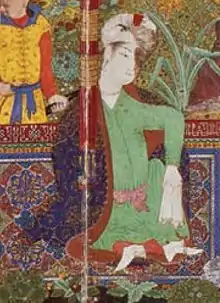Ya'qub Beg
Yaqub b. Uzun Hasan[1] (Persian: یعقوب بن اوزون حسن, Azerbaijani: سلطان یعقوب) commonly known as Sultan Ya'qub (سلطان یعقوب) was the Bayandur leader of the Aq Qoyunlu from 1478 until his death in December 24, 1490. A son of Uzun Hasan, he became the ruler of the dynasty after the death of his brother Sultan Khalil. The borders of Aq Qoyunlu dynasty remained stable during his reign. In his book Alam-Aray-i Amini, Fazlallah Khunji Isfahani praised him as a decent successor of Uzun Hasan.[1] Other historians also praised Ya'qub for his patronage of scientists and poets.
| Ya'qub Beg | |
|---|---|
| Padishah | |
 Ottoman painting portraying Ya'qub Beg | |
| Sultan of the Aq Qoyunlu | |
| Reign | 1478 – 24 December 1490 |
| Predecessor | Sultan Khalil |
| Successor | Baysunqur |
| Died | 24 December 1490 Karabakh |
| Issue | Baysunqur |
| Father | Uzun Hasan |
| Mother | Seljuk Shah Begum |
| Religion | Sunni Islam |
Reign
At the outset of his reign, Ya'qub faced a revolt from the Bayandur princes Alwand Beg and Kusa Haji in Shiraz and Isfahan respectively, but both revolts were crushed. The biggest revolt during his reign was that of Shaykh Haydar, the father of Ismail I, which resulted in the death of Haydar.[2] In 1480, Qaitbay, the Mamluk sultan of Egypt, sent an army under his Pecheneg commander Yashbak al-Zahiri to invade Diyar Bakr. Ya'qub consequently sent an army under Bayindir Beg, Sulayman Beg Bijan and Sufi Khalil Beg Mawsilu to counter the army. The two forces clashed in November of the same year, which resulted in a Aq Qoyunlu and capture of Yashbak al-Zahiri, who was executed a few days later. In the same year, Ya'qub's forces defeated and killed Balish Beg, the commander-in-chief of Syria, who had attempted to conquer Diyar Bakr.[2]
Under Ya'qub, the realm remained the same size as that of his father, and the institutions of realm was strengthened. He retained the same ranks and land-grants that his subjects had received from his father. He did, however, launch a land reform in order to consolidate his realm, creating a stable government. The Aq Qoyunlu used a political system based on the old iqta' (land grants) which had been in use since the pre-Seljuk period. This system, known as the soyurghal (benefice), had been in use since the time of the Jalayirids. It excluded the owner of an iqta from taxation, and also made him autonomous. The reform was set in motion by Ya'qubs tutor and wakil Qazi Isa Savaji.[2][1] Fazlallah Khunji Isfahani condemned the abolition of the soyurghal, claiming that it had disturbed many of the religious scholars in Shiraz. The Encyclopaedia Islamica considers the truthness of his claim uncertain, stating that; "It must be reiterated that his information on the impact of these reforms mainly refers to Fars, however it is virtually the only contemporary source on the topic and therefore central to any understanding of it. His stance is clearly partisan since the reforms seem to have adversely affected his relatives."[2] After Ya'qub's death, the land reform was cancelled.[2][1]
Yaqub became severely ill and died in December 24, 1490 in Karabakh. A number of scholars believe that he was poisoned by his wife.[2] The leading figures of the confederation installed his eight year old son Baysunqur on the throne to increase their own power. This marked the start of the decline of the Aq Qoyunlu.[2]
Imperial ideology
The Aq Qoyunlu displayed their legitimacy by rebuilding ruined Ilkhanate buildings, including the palace of Ujan near Tabriz, originally founded by Ghazan (r. 1295–1304). By including areas which had represented kingship in their court ceremonials, the Aq Qoyunlu were to use the utilise the customs of their predecessors, in order to strengthen their own kingship. This practise had been adopted from the Ilkhanate themselves, who rebuilt Sasanian buildings, notably the palace of Shiz (Takht-e Soleyman). Aq Qoyunlu historiography represents Ya'qub hunting around the palace of Ujan in the same manner as the Sasanian monarch Bahram V (r. 420–438).[3]
Poetry
Khatai Tabrizi, an Azeri poet of the 15th century, dedicated a mathnawi entitled Yusof wa Zoleykha to Sultan Ya'qub,[4] and Ya'qub even wrote poetry in the Azerbaijani language.[4]
References
- Quiring-Zoche 1986, pp. 163–168.
- Langaroodi & Negahban 2008.
- Leube 2018, pp. 480–482.
- Javadi & Burrill 2012.
Sources
- Langaroodi, Reza Rezazadeh; Negahban, Farzin (2008). "Āq-qūyūnlū". In Madelung, Wilferd; Daftary, Farhad (eds.). Encyclopaedia Islamica Online. Brill Online. ISSN 1875-9831.
- Leube, Georg (2018). "Aqquyunlu Turkmen Rulers Facing the Ruins of Takht-i Jamshīd". Der Islam. De Gruyter: 479–506. doi:10.1515/islam-2018-0031.
- Javadi, H.; Burrill, K. (May 24, 2012). "AZERBAIJAN x. Azeri Turkish Literature". Encyclopaedia Iranica.
- Quiring-Zoche, R. (1986). "Āq Qoyunlū". Encyclopædia Iranica, online edition, Vol. II, Fasc. 2. New York. pp. 163–168.